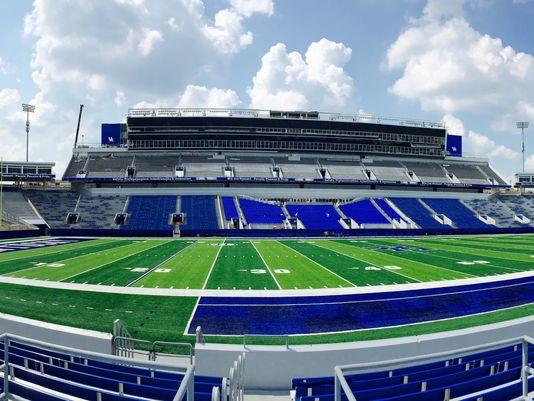
Associated Press Writer Bruce Schreiner in Louisville, Kentucky
Kentucky campus police have charged law student Peyton Wilson with second degree wanton endangerment for operating a drone that crashed into a section of Commonwealth Stadium before theWildcats’ season-opening football game against Louisiana-Lafayette.
The school also says it has forwarded its findings to the Federal Aviation Administration for further review.
Wilson, 24, of Louisville, Kentucky, was operating the unmanned aircraft outside the remodeled stadium Saturday night before it crashed into suite-level glass on the south side. UK police chief Joe Monroe said Friday morning in a news conference that the drone had a high-powered camera attached and that Wilson was flying it for personal or possible commercial use.
“We don’t feel like it was a prank,” said Monroe, adding that police had recovered images from the camera.
Monroe also said Wilson had flown the drone over other campus sporting events, including a soccer game last Friday night. But the aircraft’s most recent flight caused concern on a night filled with excitement as the Wildcats unveiled the “new” Commonwealth after a $120 million renovation.
The drone hovered close by military skydivers parachuting into the packed stadium with American flags. One of the skydivers told police he had to take evasive measures to avoid the drone, which came within 20 feet of his parachute.
No one was injured, and the stadium wasn’t damaged.
“It’s very dangerous when you have a remote controlled, non-piloted aircraft that’s flying in areas where there’s lots of people,” Monroe added.
Wilson was cited to appear in court for the misdemeanor charge punishable by a year in jail and a fine. Any discipline by UK would be handled by the school’s student code of conduct violation office.
The Associated Press called a relative of Wilson, who had no comment and didn’t want to be identified. The relative had spoken with Wilson, who indicated he didn’t want to comment.
The university does not have a written policy banning drones and is studying the issue.
“We hope that this will set a precedent that this is not going to be tolerated at the University of Kentucky in these venues without prior approval,” Monroe said.
FAA policy for airspace around special events such as games restricts flights for three nautical miles and up to 3,000 feet. Safety guidelines for model aircraft suggested on the agency’s website include flying below 400 feet, not flying within five miles of an airport and avoiding “people or stadiums.”
Helipads are considered airspace as well, and Wilson’s drone was within a half-mile of two at nearby UK Chandler and Baptist hospitals, both within walking distance of the stadium. Chandler’s helipad could be seen just beyond where the drone hovered behind a scoreboard above the west end zone.
“This could have caused serious problems for them as well,” said Monroe, adding that school officials will post signs in campus parking lots stating they are no-drone fly zones.
It was the second incident involving a drone at a sports event in the past week.
An unmanned aircraft plummeted into empty seats and caused a scare during a women’s singles match last Thursday night at the U.S. Open. No one was injured, but it broke into pieces as it crashed.
A high school science teacher who had been flying the drone from a park outside the tennis venue was arrested last Friday on reckless endangerment and other charges, police said.
The FAA put drone and model-plane enthusiasts on notice last October that it’s illegal to fly the aircraft near Major League Baseball, NFL and NCAA Division I college football games and major auto races.
The move came months after police detained people for using small drones at Carolina Panthers and University of Texas football games. This past June, police questioned a man flying a drone near a gate at Citizens Bank Park in Philadelphia during a Colorado Rockies-Philadelphia Phillies game.